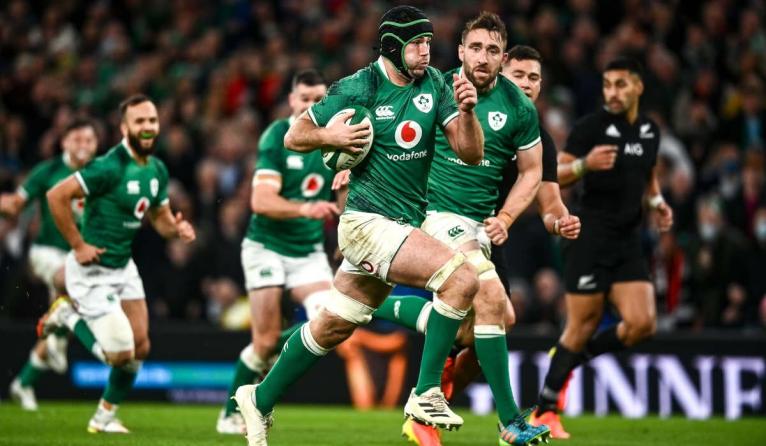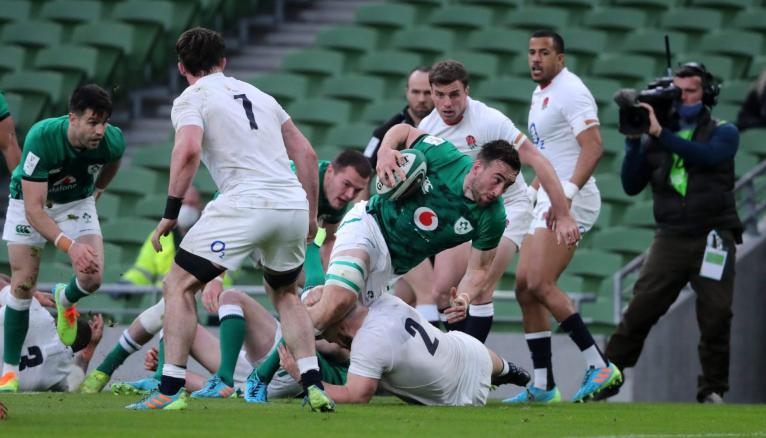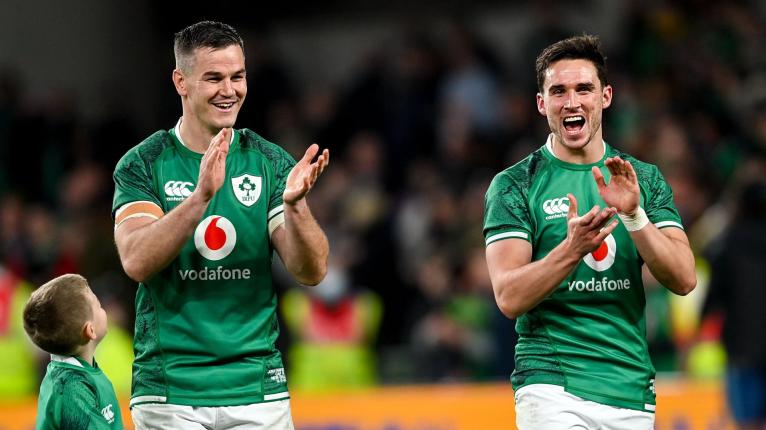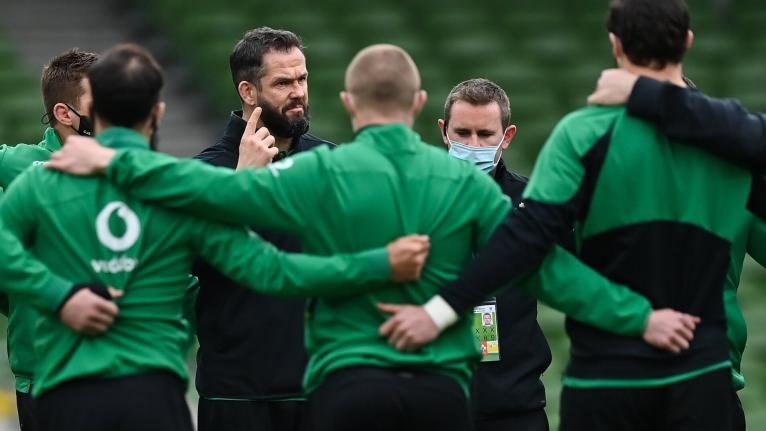Think about Ireland these days and you can’t help yourself thinking ahead to France in 18 months-time. Or rather you can’t help looking back to France 2007, New Zealand 2011, Cardiff 2015, Japan 2019 or any other World Cup year for that matter. Home before the postcards is the standard joke. Aside from Italy, they’re the only Tier One nation yet to reach a World Cup semi-final.
That stings. Irrespective of everything else Ireland have achieved in the professional era – two Grand Slams, two further Six Nations Championships, seven Heineken Cups shared between three provinces – their persistent failure in World Cups is an open wound. “I don’t like looking back on them,” Brian O’Driscoll said of his World Cup experience in 2019. “I get this sick feeling,” was former coach Eddie O’Sullivan’s recollection of 2007, “a feeling you let everyone down.”
Andy Farrell has his own demons to consider, not just when he was Stuart Lancaster’s assistant with England in 2015 but also when he was part of Joe Schmidt’s coaching ticket in Japan. So he knows the score, that there will be people looking for the hairline cracks that may become fractures: the minor issues that could become major ones when his Irish team lines out for the tenth edition of the Rugby World Cup.
Even so Farrell has contentedly played a balancing act from his first day in this job, keeping one eye permanently on France 2023, the other on the immediate task in hand.
Few, outside the camp, were even prepared to admit this was a policy prior to last November. Then the All Blacks were outplayed and the Lancastrian’s quiet evolution made a noise that was heard across the world; his relocation of Andrew Porter from tighthead to loosehead, his promotion of Andrew Conway and Jack Conan from the bench, his decision – since replacing Schmidt as head coach in November 2019 – to hand debuts to Ronan Kelleher, Caelan Doris, Jamison Gibson Park and James Lowe. All eight were key players in Ireland’s 29-20 win over New Zealand.

Ordinarily a result like that would land you the Six Nations favourites tag. Except France went and beat the All Blacks even more impressively a week later while England defeated the world champion Springboks. Just as significantly, when Ireland fans booked their flights for this season’s away trips, Paris and London were the destinations.
These things matter in this tournament. Yes, Ireland won a grand slam as recently as 2018 via stopovers in the Stade de France and Twickenham but the previous year they did an away double over France and England was 1972.
That’s Six Nations rugby for you. It is not a competition, more a form of torture.
Ask any Ireland fan, though, and they’ll all tell you the same thing, that they’d trade another Six Nations, even another Grand Slam, for a crack at the next World Cup, a run beyond the quarter-finals. In other words, they’d forgive Farrell for trying out a Robert Baloucoune over a Keith Earls across the next seven weeks, for selecting a James Hume over a Garry Ringrose, even a Tom O’Toole over a Tadhg Furlong.
A year ago, when they were stuttering to a win over Scotland after losing their opening two games to France and Wales, patience was thinner; Farrell repeatedly talking about his ‘heads up rugby’ philosophy when there simply wasn’t a correlation between what he was promising and what his team were delivering.

But that changed in the third weekend in March. England were in town. Ireland had a cut at them. Conan was a surprise pick at No8 and proved to be an inspiration, creating one try, scoring another. The 32-18 win banked credit for the coach and by the time New Zealand were so comprehensively outplayed in November, questions about his suitability for the role disappeared completely.
Suddenly all his policy choices seemed logical, the early promotions of athletic front-rowers Kelleher, O’Toole and Dan Sheehan to his squad, the positional switch by Porter, the selection of Gibson Park over Conor Murray even when the Leinster man wasn’t first-choice at his club; the faith he showed in the smallish flanker, Josh van der Flier.
It all bodes well. Compared to Wales, their opening opponents in this year’s championship, they have pretty much everyone available, Jacob Stockdale the only notable absentee. Yet even if injuries come, there’s more depth available to Farrell than any previous Ireland coach has ever had. Remember the 2015 World Cup quarter-final against Argentina, when Johnny Sexton, Sean O’Brien, Peter O’Mahony, Paul O’Connell and Jared Payne were all missing? The back-ups were second rate.
That isn’t the case now, except perhaps at tighthead. Otherwise they are in good shape. Porter, Kelleher and Furlong may sound like a firm of accountants but they’re as powerful, mobile and skilled a front row as any in world rugby. Locks Iain Henderson, James Ryan and Tadhg Beirne have the capacity to operate at world class level. The back row is overflowing with options, van der Flier, Doris and Conan being the best of them. Murray was once indispensable at scrum half, now he’s doing well to even get into the match-day squad. In the back three and midfield there’s both quality and depth, with uncapped Connacht wing, Mack Hansen, an exciting addition to the squad.
Then there’s Sexton.
Great players, at their core, are egotists even if they don’t show it, even if they don’t know it. They care about what they’ve done in the game, how much they’ve won in it.
Sexton’s CV reads four Heineken Cups, a Grand Slam, three Six Nations titles, two series as a starting British and Irish Lion, a world player of the year title.

But read his resume a second time and you’ll notice something missing: World Cups. In 2011 – he had the shirt but allowed Ronan O’Gara take it off him by the time Ireland reached the knock-outs; in 2015 he was injured for the quarters, in 2019 he picked up a knock and struggled against the All Blacks as the Irish dream crashed yet again.
So, he too is hanging on for 2023, privately investing in specialist medical therapists to get the most of his obsession. People repeatedly talk and write about his injury profile and vulnerability yet the stats tell us something different, that he has started 27 of Ireland’s previous 30 games in the Six Nations.
He’s 36 now, flecks of grey visible in his hair. Yet he shows no sign of faltering, his season managed carefully by the IRFU, allowing him peak for internationals and rest in between. He has Farrell’s backing, who handed him the captaincy and who quickly came to the realisation that while sticking with a veteran in the middle of a World Cup cycle is a risk, dispensing with him would be a bigger gamble.
Faz and Johnny. Johnny and Faz. One is considered young in his trade, the other over-the-hill.
Yet they share an obsession with winning. You think of a story about the young Farrell, the 16-year-old who became a teenage father, and then doubled up on his efforts to make a better life for his new family, rising at 5.30am each morning to do an hour’s training before he cycled across Wigan for a day’s work as an apprentice joiner. Job done, he’d cycle back to Central Park for a further training session with the second-team squad.
By 17 he had broken into the most successful and toughest side rugby league had ever known. By 21 he was their captain. A quarter of a century on, he’s continuing to break the mould, crossing sporting and geographic boundaries to do so.

No previous Irish coach has ever talked as openly about planning for a World Cup. And in truth there wasn’t that much of a buy-in from the Irish public in the days when the team were stuttering to wins over Georgia and Scotland in November 2020. But subsequent victories over England and New Zealand won people over, earning him the right to experiment further. In fact there’s probably a yearning for him to do so.


Comments
Join free and tell us what you really think!
Sign up for free